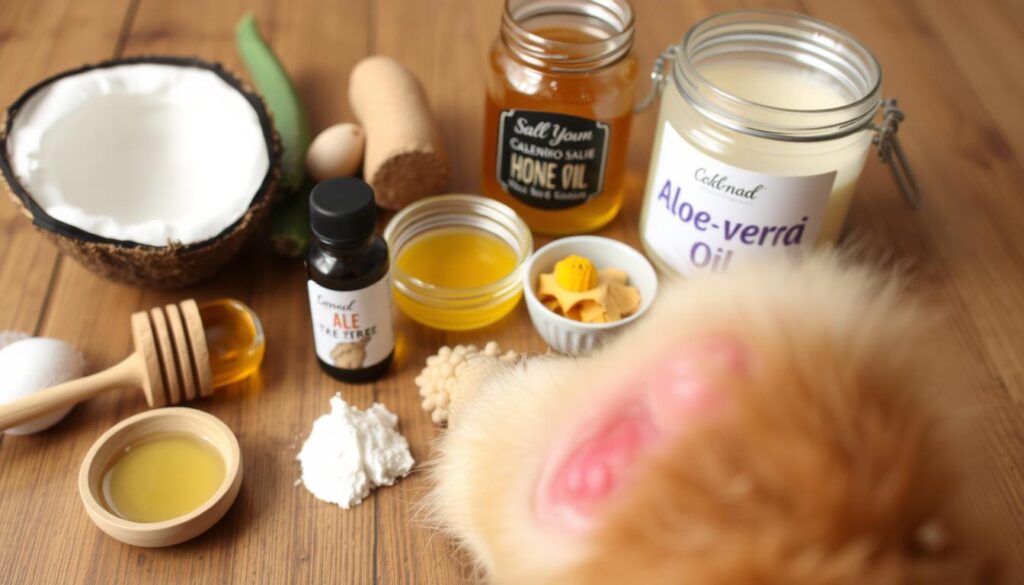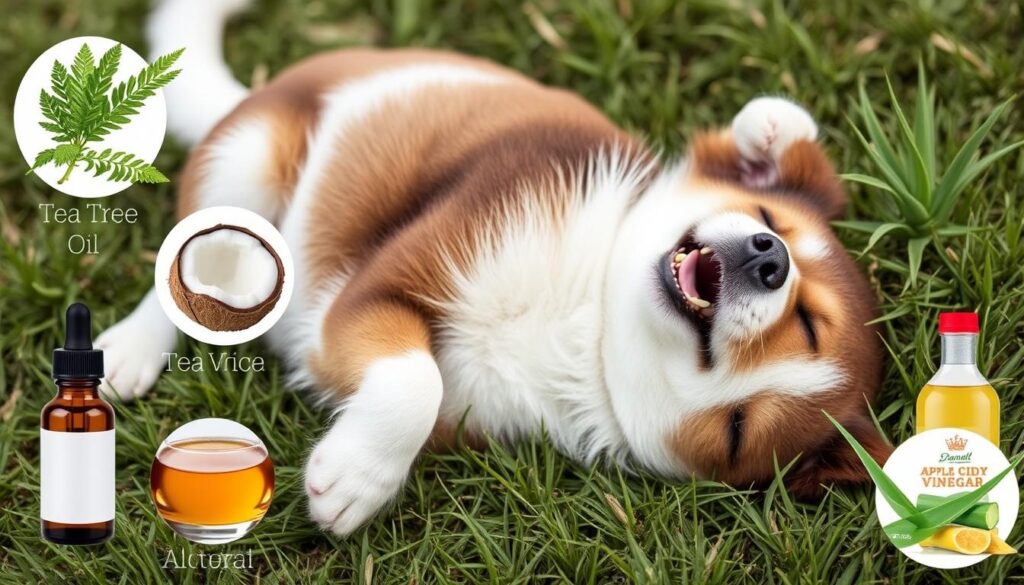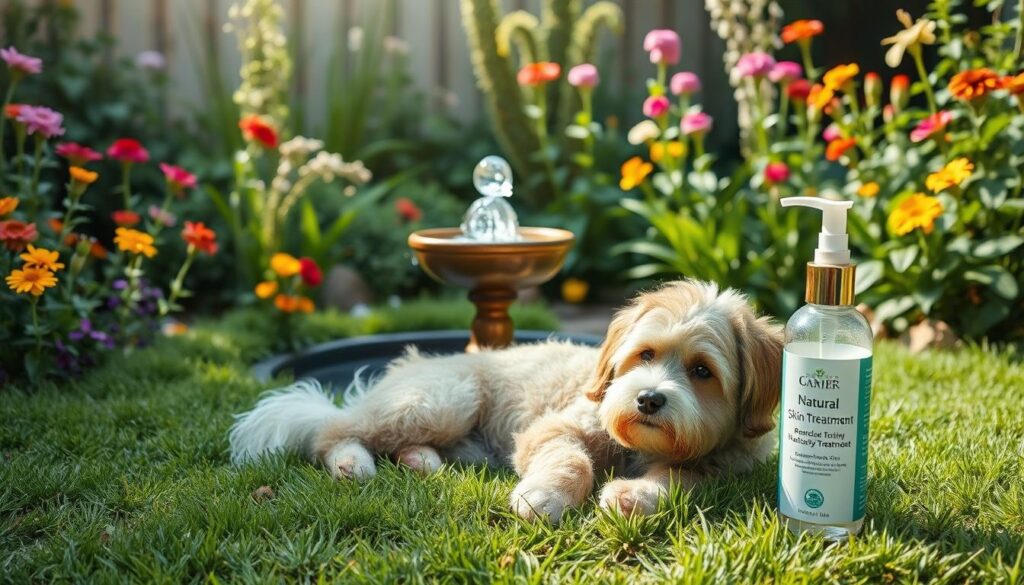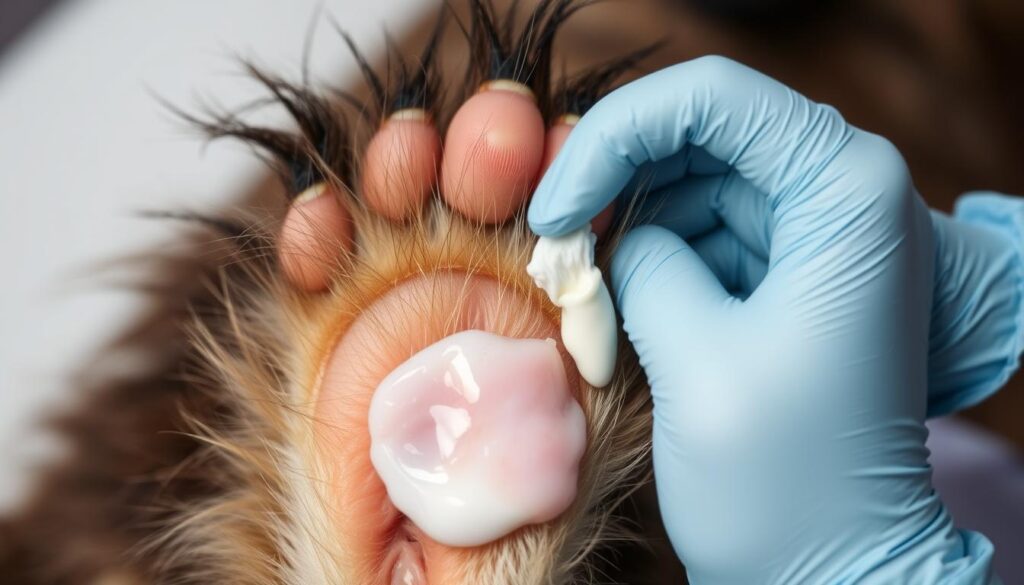How To Treat Skin Infections In Pets Naturally As a devoted pet owner, being ready for your pet’s health issues is key. Skin infections are common and can be tough to handle, especially if you prefer natural remedies. Knowing the causes, symptoms, and types of skin infections is crucial for the best care.
There are many natural ways to help pets with skin problems without just using medicine. You can try topical treatments, herbal remedies, changing their diet, and giving them immune-boosting supplements. This approach can ease your pet’s discomfort and improve their skin health.
Key Takeaways
- Familiarize yourself with the common causes and symptoms of skin infections in pets
- Explore natural topical treatments and herbal remedies to soothe and heal skin issues
- Implement dietary changes and supplements to support your pet’s immune system
- Understand when to seek veterinary assistance for severe or persistent skin problems
- Incorporate a holistic approach to address the root causes of skin infections in pets
Understanding Skin Infections in Pets
Your pet’s skin health shows how well they are doing overall. Dogs and cats can have different skin problems. These problems might show deeper issues with their immune system or toxins in their body. Knowing what causes and shows skin infections helps pet owners help their pets stay happy and healthy.
Causes and Symptoms of Skin Infections
Pets can get skin infections from many things like allergies, too much bacteria or fungus, parasites, and hormonal problems. Signs of skin infections, or pet dermatitis, include a dull coat, flaky skin, and a bad smell. They might also lose hair, have dry, itchy skin, and even get red, thick skin, yeast infections, hot spots, and tumors.
Common Types of Skin Infections in Pets
Pets can have many skin problems, like allergic reactions and infections. Some common skin infections in dogs and cats are:
- Pyoderma: A bacterial skin infection that can cause redness, pus-filled lesions, and hair loss
- Yeast infections: Overgrowth of naturally occurring yeast on the skin, leading to itching, odor, and discoloration
- Mange: A parasitic skin condition caused by mites, resulting in hair loss, crusty skin, and intense itching
- Hot spots: Also known as acute moist dermatitis, these are areas of severe skin inflammation and irritation
- Allergic dermatitis: Skin reactions to environmental allergens, food, or other triggers, causing itching, redness, and irritation
Understanding pet skin infections helps pet owners work with their vet. They can make a good plan to keep their pets’ skin healthy and their overall well-being.
Natural Home Remedies for Skin Infections

There are many natural home remedies for pet skin infections. These remedies use natural topical treatments and herbal remedies. They also include dietary changes and supplements to help skin health.
Topical Treatments and Herbal Remedies
Topical treatments like tea tree oil and antibiotic sprays can fight pet skin infections. They kill bacteria and reduce inflammation. Herbal remedies like aloe vera and chamomile help heal dog dermatitis and other skin problems.
Dietary Changes and Supplements
Switching to a raw meat diet can improve your pet’s skin. Supplements like probiotics and vitamin C boost the immune system. These dietary supplements for dog skin health work well with topical treatments.
Using these natural remedies can help manage skin infections in pets. It’s important to focus on overall health for lasting relief.
“The power of nature lies in its ability to heal and restore balance, and this philosophy holds true when it comes to treating skin infections in our beloved pets.”
How To Treat Skin Infections In Pets Naturally

Treating skin infections in pets naturally means looking at the whole picture. It’s about finding the root cause and boosting their immune system. By using natural therapies, you can help your pet without just relying on medicine.
Using topical antibacterial products is a key step. Essential oils like tea tree or lavender oil can be mixed and applied to the skin to calm inflammation and help healing. Also, colloidal oatmeal baths or aloe vera gel can soothe and hydrate irritated skin.
Changing their diet and adding supplements is also important. Omega-3 fatty acids, probiotics, and foods high in antioxidants can boost their immune system and lessen inflammation. Supplements like vitamin C, vitamin E, and zinc can also help with skin issues.
To help with healing, focus on detox and cleansing. Regular grooming, baths, and natural shampoos can clear out toxins and dirt from the skin. Also, using probiotic supplements can support the body’s natural detox process.
Lastly, it’s key to cut down on environmental toxins and manage stress. Stay away from harsh chemicals, make a calm living space, and keep your pet active and playful. This helps their overall health and skin.
By following these natural steps, you can take a holistic approach to pet dermatitis, tackling the root causes and supporting your pet’s health and wellness.
Boosting Your Pet’s Immunity

Keeping your pet’s immune system strong is key to their health. Probiotics and medicinal mushrooms are great allies in this fight.
Probiotics and Medicinal Mushrooms
Most of your pet’s immune system is in their gut. So, taking care of their gut health is very important. Daily probiotics can help balance gut bacteria and boost immune function.
Medicinal mushrooms like Reishi, Cordyceps, and Chaga also support your pet’s immune system. These supplements can help fight skin infections and chronic diseases.
| Supplement | Benefits for Pet’s Immunity |
|---|---|
| Probiotics | Balances gut bacteria, restores immune function |
| Medicinal Mushrooms | Supports overall immune system health |
Adding these natural supplements to your pet’s diet can boost their immune system. This helps keep their skin healthy. A strong immune system means a happy, healthy pet.
“A healthy gut is the key to a healthy pet. Probiotics and medicinal mushrooms work together to strengthen the immune system and support skin health.”
Detoxification and Cleansing

Keeping your pet healthy is key to treating skin infections. Detoxification is a big part of this. It removes toxins and helps your pet heal.
Herbal teas are great for detox. Mix calendula, chamomile, parsley, burdock, nettle, and dandelion for a special tea. Milk thistle is also good for the liver.
Exercise, massage, and bodywork help too. They boost the lymphatic system and circulation. Together with herbal teas, they help detoxify pets naturally. This makes your pet healthier and more resilient.
| Herb | Benefit |
|---|---|
| Calendula | Anti-inflammatory and wound-healing properties |
| Chamomile | Calming and soothing effects, supports skin health |
| Parsley | Detoxifies the kidneys and bladder |
| Burdock | Cleanses the blood and lymphatic system |
| Nettle | Reduces inflammation and supports skin health |
| Dandelion | Aids in liver and kidney detoxification |
| Milk Thistle | Protects and supports the liver |
Using herbal teas for dog detox and other cleansing methods for animal skin health helps your pet. It supports their overall health and fights skin infections.
Reducing Environmental Toxins and Stress

When detoxifying your pet, it’s key to keep them away from new toxins. Get rid of chemicals and artificial scents at home to stop skin issues. Also, it’s vital to lower stress for pets and people to prevent skin problems.
To make a safer home for your pet, follow these steps:
- Switch to natural, fragrance-free cleaning products and personal care items
- Avoid using pesticides, herbicides, and other chemical-based treatments in your yard and garden
- Ensure your pet’s bedding, toys, and other accessories are made from organic, non-toxic materials
- Minimize your pet’s exposure to second-hand smoke and other airborne pollutants
It’s also important to lessen stress on your pet’s skin. Try relaxation techniques, regular exercise, and positive training to keep stress down. These can help keep their immune system strong.
“Reducing stress and eliminating toxins from the environment are crucial steps in managing skin conditions in pets. By creating a calming, chemical-free space, you can help your furry friend heal and thrive.”
Fixing both internal and external issues is key to helping your pet with skin problems. A holistic approach can cut down toxins, reduce stress, and boost your pet’s health.
When to Seek Veterinary Assistance

Natural remedies can help with pet skin infections, but sometimes you need a vet. Knowing when to get help ensures your pet gets the right care. Look for signs that mean you should take your pet to the vet.
If the infection is very bad, covers a lot of skin, or doesn’t get better at home, see a vet. Severe infections might need special medicines or treatments to heal and stop more problems.
Also, watch out for other signs like vomiting, feeling tired, eating less, or acting sick. These could mean there’s a bigger issue that needs a vet’s help.
When deciding when to see a vet for pet skin issues or signs of serious skin infections in animals, it’s best to be careful. Quick vet care can help your pet recover faster and stay healthier.
“Early intervention and proper treatment are key to managing skin infections in pets and preventing them from becoming more severe.”
Also Read: Nutritional Excellence: Best Diet For Animal Health
Conclusion
Treating skin infections in pets naturally means looking at the big picture. It’s about fixing the root causes and helping your pet feel better overall. Using a mix of topical treatments, diet changes, supplements, detox methods, and ways to reduce stress can help. This way, you can fix common skin issues without just using medicine.
For natural pet skin treatments, consider using things like aloe vera, essential oils, and herbal balms on the skin. Changing your pet’s diet to include omega-3 fatty acids, probiotics, and antioxidants can also help. Adding supplements like medicinal mushrooms and detox steps can make your pet’s healing faster.
It’s also key to tackle environmental toxins and cut down on stress to keep your pet healthy. With this natural approach, your pet can get the support they need for healthy skin and strength. By choosing a natural way to care for your pet, you help them stay comfortable and healthy for a long time.
FAQs
Q: What are some natural remedies for dog skin infections?
A: Some effective natural remedies for dog skin infections include apple cider vinegar, which has antibacterial and antifungal properties, and coconut oil, known to help soothe dry skin and itching. Always consult your veterinarian before starting any new treatment.
Q: How can I help soothe my dog’s itchy skin?
A: To help soothe itchy skin in dogs, you can bathe them with warm water and add natural ingredients like oatmeal or apple cider vinegar to the bath. Additionally, applying coconut oil directly to your dog’s skin can provide relief.
Q: What should I do if my dog has dry skin?
A: If your dog has dry skin, consider using home remedies like coconut oil or oatmeal baths to moisturize and relieve itching. Ensuring your dog is well-hydrated and using a humidifier can also help. If the condition persists, take them to the vet.
Q: Can I use apple cider vinegar on my dog’s skin?
A: Yes, apple cider vinegar can be applied to your dog’s skin as it has antibacterial and antifungal properties. Dilute it with water before applying to help soothe irritated skin and alleviate itching. Always consult your veterinarian for advice tailored to your dog’s specific needs.
Q: How do I know if my dog has a yeast infection?
A: Common signs of yeast infections in dogs include persistent scratching, red or inflamed skin, and a strong odor. If you suspect your dog has a yeast infection, consult your veterinarian for an accurate diagnosis and treatment options.
Q: What are the risks of untreated skin infections in dogs?
A: Untreated skin infections in dogs can lead to increased discomfort, secondary infections, and potential spread to other areas of the body. It’s essential to monitor your dog’s condition and consult your veterinarian if you notice any concerning symptoms.
Q: Are there specific sprays for dog skin infections?
A: Yes, there are various sprays formulated to treat dog skin infections, often containing natural ingredients to help soothe and protect your dog’s skin. Look for sprays with antibacterial and antifungal properties, and consult your vet for recommendations.
Q: When should I take my dog to the vet for skin issues?
A: You should take your dog to the vet if you notice severe itching, open wounds, persistent redness, or if home remedies do not relieve the symptoms. Your veterinarian can prescribe medication or recommend treatments tailored to your dog’s specific condition.
Q: How can I protect my dog from skin allergies?
A: To protect your dog from skin allergies, keep their environment clean, bathe them regularly with hypoallergenic products, and monitor their diet for potential allergens. If you suspect allergies, consult your veterinarian for testing and treatment options.
Q: Can I use home remedies for my dog’s ear infections?
A: While some home remedies may help with minor ear irritations, it’s crucial to consult your veterinarian before attempting any treatment for ear infections. They can prescribe appropriate medication and guide you on safe home care practices.
Source Links
- https://www.dogsnaturallymagazine.com/10-steps-to-manage-dog-skin-conditions/
- https://www.petmd.com/dog/general-health/home-remedies-for-dogs
- https://www.1800petmeds.com/education/treat-dog-bacterial-skin-infection-9.html




